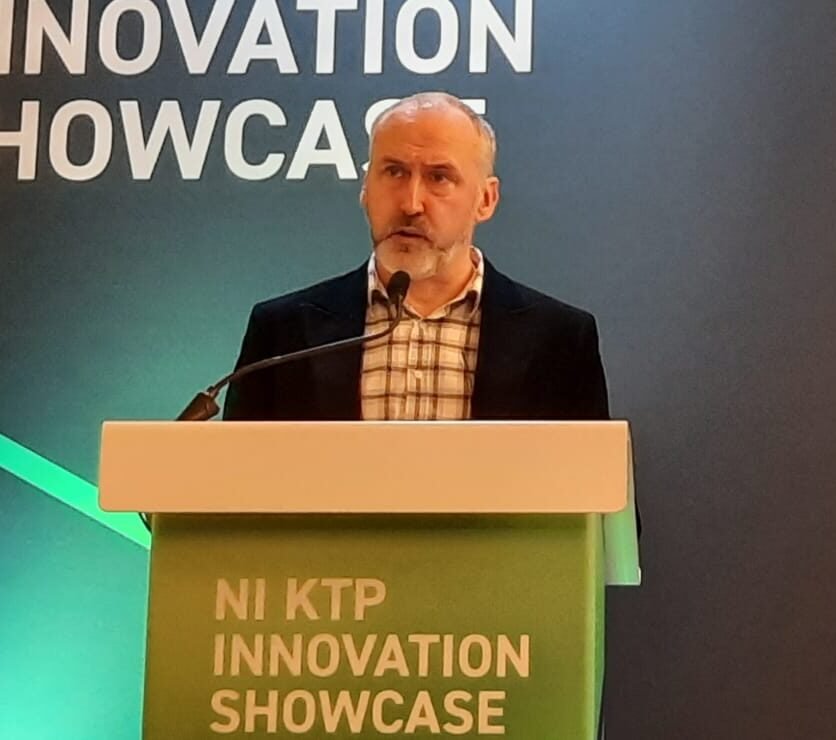
Upcoming Events

Creating Accessible Documents
Date & Time
Thursday 5th December, 2024
9:30 AM - 4:30 PM
Venue
Online
CPD Certified
Availability
4 Spaces left
Purchase
Overview
If you are responsible for creating any content whether that be producing documents, social media, or web content for your organisation, this course will give you a strong grounding to make the most accessible content possible. Documents are a great starting point for everyone to learn universal accessible content basics as well as getting to grips with the accessibility features of the most common tools including Office 365 programs and PDFs.
Our Creating Accessible Documents course gives you the knowledge to create highly accessible documents. If you are from the public sector, publishing accessible digital content including documents is now a legal requirement. You will learn how to make documents accessible using a host of different tools, and how to apply plain English principles to create easy to understand content.
Leave the day fully immersed in document accessibility with the confidence to ensure your documentation complies with the regulation and is accessible to all.
Learning Objectives
By the end of this training, delegates should have the knowledge and tools to:
Understand the legislation relating to accessible documents
Embed basic principles of accessible documents for the following platforms:
Word
PowerPoint
PDF
Email
Check documents for accessibility
Adopt technologies to help create accessible documents
Use accessible documents effectively
Lead Trainers
Ben Watson
Accessibility Consultant
All Able
George Rhodes
Accessibility Consultant
All Able
Agenda
9:30 am
Welcome And Clarification Of Learning Objectives
9:45 am
Session 1: An Introduction to Accessible Documents
How are documents covered in the legislation
Basic principles of creating accessible documents
Why documents are the core of accessible content design
Ben Watson
Accessibility Consultant
All Able
George Rhodes
Accessibility Consultant
All Able
11:00 am
Morning Break
11:10 am
Session 2: Checking For Accessibility
As part of the checking for accessibility session, attendees will be asked to suggest documents that we can review as a group. This can be done either in advance of the day or as the discussion unfolds.
· Understanding different document platforms
· Gain techniques for checking for accessibility
· Microsoft Accessibility Checker
· Live document walkthroughs
· Adobe Pro and making accessible PDFs.
Ben Watson
Accessibility Consultant
All Able
George Rhodes
Accessibility Consultant
All Able
12:30 pm
Lunch Break
1:00 pm
Session 3: Writing in Plain English (Part 1)
What is plain English?
Plain English and accessibility
How to write in plain English: core principles
Ben Watson
Accessibility Consultant
All Able
George Rhodes
Accessibility Consultant
All Able
2:00 pm
Session 4: Writing in Plain English (Part 2)
Group exercise: turning text into plain English
Exploring the benefit of plain English for your organisation
Plain English toolkit
Ben Watson
Accessibility Consultant
All Able
George Rhodes
Accessibility Consultant
All Able
2:50 pm
Afternoon Break
3:00 pm
Session 5: Using Technology for Accessible Documents
Technologies that can help create and use accessible documents
Creating accessible templates
Ben Watson
Accessibility Consultant
All Able
George Rhodes
Accessibility Consultant
All Able
3:30 pm
Session 6: Open Q&A
In this session you will have the opportunity to ask our experts all your accessibility questions, revisiting key sessions from the training and gaining key insights into how you can put what you’ve learned into practice.
Ben Watson
Accessibility Consultant
All Able
George Rhodes
Accessibility Consultant
All Able
4:30 pm
Training Close
*programme subject to change
Pricing
Public Sector
£345 + VAT
Private Sector
£445 + VAT

Ensuring Public Sector Website Accessibility and Compliance
Date & Time
Wednesday 27 November, 2024
09:30 AM - 16:30 PM
Venue
Online CPD Workshop
Availability
3 Spaces Left
Purchase
Overview
This one day course is for people new to accessibility and experienced alike. Improving digital accessibility in an organisation requires changes from many different areas of a business. It is not just about auditing for accessibility compliance, or making reasonable adjustments when there are requests. It is about building a consistent approach to make accessibility part of the core behaviours of an organisation in all areas. Whether that is during the procurement of new digital platforms, recruiting new members of staff, content writing and document production, including accessibility into policies and supporting all stakeholders in inclusive and proactive ways.
This event is focused on understanding the regulations, policy and how to cover all of the important management tasks to defend against legal challenges, along with embedding accessibility as a responsibility for all staff.
Learning Objectives
By the end of the workshop, delegates will gain:
An introduction to accessibility and how to begin persuading others to join in on accessible practices.
A better understanding of accessibility legislation in the UK and current applicable legislation including the public sector bodies accessibility regulations and the upcoming EU Accessibility Act
Web content accessibility guidelines, how to conduct and report on basic web testing and a host of tools to help you.
Comprehensive guidance on including accessibility into procurement processes to help you avoid buying in problems.
An introduction to accessible document and basic accessibility practices which you can incorporate into all staff produced documents
Resources Provided
To support delegate learning, we will be providing training materials and resources for them to take away to help implementation of their learning after the course. We will provide:
Practical exercise materials
Full slide deck and notes printed
Copies of our award-winning Digital Accessibility Toolkit including; reference material, templates and cheat sheets
The regulations
Quick accessibility checks
Auditing, reporting and prioritisation
Procurement and suppliers
3rd party content and systems
Accessibility statements
Disproportionate burden
Accessible documents
Accessible events
Video accessibility
Writing in plain English
Key Speakers
Ben Watson
Accessibility Consultant
All Able
George Rhodes
Accessibility Consultant
All Able
Agenda
9:30 am
Welcome
9:45 am
Accessibility and Inclusion
10:10 am
Session 1: Understanding the Accessibility Requirements for Public Sector Bodies
The Public Sector Bodies (Websites and Mobile Applications) Accessibility Regulations 2018 - how did the regulation come about and what it aims to achieve
Apply the Website Content Accessibility Guidelines (WCAG) 2.2
Outlining who and what falls under the new legislation and who is exempt
Memorandum of Understanding and how the process of monitoring and enforcement operates
Getting senior management on board – realising the scale of work involved and prioritisation
Prioritisation and risk assessment exercise
Budgeting resources and tools to ensure value for money
Sources for keeping in touch with the latest developments
Ben Watson
Accessibility Consultant
All Able
George Rhodes
Accessibility Consultant
All Able
11:00 am
Morning Break
11:15 am
Preparing your Organisation for the Changes - Policy and Practical Steps
Publishing the accessibility statement
Outlining the requirements of an accessibility statement
Discussion exercise on the purpose of accessibility statements and what other information users might want
Procurement and Suppliers
What to include in procurement, tenders and contracts
What to expect from suppliers
What to do with existing suppliers
3rd Party systems and your responsibilities
3rd Party responsibility matrix
Your responsibilities exercise
Ben Watson
Accessibility Consultant
All Able
George Rhodes
Accessibility Consultant
All Able
12:30 pm
Lunch
1:00 pm
Decide how to check for accessibility problems
Reviewing internal processes and ensuring that all staff involved are effectively trained
Basic checks for accessibility – Where do you need to address the problem and how
Image alternatives
1. Video and Audio content
2. Documents
3. Websites (intro)
4. Other comms
Ben Watson
Accessibility Consultant
All Able
George Rhodes
Accessibility Consultant
All Able
2:30 pm
Afternoon Break
2:40 pm
Achieving Accessibility Under the New Standard
Which web content accessibility guidelines do you need to adhere to and understand WCAG 2.2
Learn about the process of testing sites for accessibility using automatic scanning tools versus an audit
Live testing exercise
Understanding accessibility evaluations and testing results
Issue reporting, exclusions and disproportionate burden – what is it and what does it apply to
How diverse user testing can inform accessibility audits and future development plans
Discussing common accessibility issues and how to overcome them
Creating content, including dynamic and visual, with accessibility in mind
Ben Watson
Accessibility Consultant
All Able
George Rhodes
Accessibility Consultant
All Able
3:40pm
Break
3:45 pm
Open Questions
In the final session, we want delegates to be able to ask any questions that they feel we haven’t fully addressed and welcome the discussion of real issues delegates are facing
This is a chance for delegates to get some consultancy time with us and a chance for real expert advice on their real issues
If you have any questions you made a note of during the day because we had to get through a lot, now is the time to ask them!
Ben Watson
Accessibility Consultant
All Able
George Rhodes
Accessibility Consultant
All Able
4:30 pm
Summary and Close
*programme subject to change
Pricing
Health & Voluntary Sector
£245 + VAT
Public Sector
£345 + VAT
Private Sector
£445 + VAT

Developing an Improved Violence Against Women and Girls Strategy
Date & Time
Tuesday 12th November 2024 09:30 AM - 15:45 PM
Venue
Online
CPD Certified
Availability
4 Spaces Left
Purchase
Overview
Violence against women and girls (VAWG) in the UK is now included within the Strategic Policing Requirement (SPR), identifying VAWG offences as a national threat, in line with offences such as terrorism and serious organised crime. The national urgency around tackling and reducing the prevalence of VAWG is felt now more than ever, as statistics estimate that 1.4 million women experienced domestic abuse in the year ending March 2023 and 798,000 women falling victim to sexual assault offences in the year ending March 2022.
In addition to this, the government’s acceptance of the Angliolni Inquiry’s recommendations reinforces the urgent need for organisations to have a more robust VAWG strategy in place.
Featuring solutions focused workshops and opportunities for interactive discussion throughout, this one-day workshop offers attendees working with victims and perpetrators a vital opportunity to critically reflect on their VAWG prevention practices.
Attendees will analyse new domestic abuse offences, evaluate rape and sexual offences investigative practices, learn how to effectively respond to diverse victims needs and discover innovative approaches to pursuing preparators, leaving the day with actionable insights to takeaway and implement into their tackling VAWG strategy.
Learning Outcomes
Receive guidance on the nuances of coercive and controlling behaviour, ensuring your organisation is proficient in identifying warning signs in victims and perpetrators alike
Learn how to identify perpetrators and take a proactive approach in tackling VAWG
Gain insights into effectively enforcing a victim-centred approach, with a view to ensure victims voices are heard throughout the criminal justice process
Learn the impacts and signs of economic abuse and how to tackle this form of violence
Engage in deep dive discussions and case studies to share insights and experiences with peers working with victims and perpetrators
Lead Expert: Carrie Bower
Domestic Abuse Lead Age UK National Charity
Carrie is a registered social worker and has over 20 years’ experience working with older adults in a local authority, the NHS and the voluntary sector.
Carrie’s role as Safeguarding Manager at Age UK includes providing operational support, safeguarding advice and delivering training across the charity.
Carrie has a specialist interest in domestic abuse and leads on Age UK’s domestic abuse policy for staff, volunteers and Age UK beneficiaries.
Expert Speakers
Cariad O’Brien
Economic Abuse lead
Refuge
Agenda
9:15 am
Logging on and Accessing the Online Platform
9:30 am
Welcome and Introduction
This introductory session will involve:
Introducing yourselves via the chat function
Housekeeping
Overview of the day and learning objectives
Brief overview of the training tools and breakout rooms
Carrie Bower
Domestic Abuse Lead, Age UK National Charity
10:00 am
How Perpetrators are Thriving Through the Lifecourse
Explore how society is systematically enabling perpetrators
Look at the routines and rituals of perpetrators
Understand how to look at the wider picture, not just the incident
Identify the subtle signs of abuse
Learn how to reduce the risk of individuals committing further offences
This session will include time for questions
Carrie Bower
Domestic Abuse Lead, Age UK National Charity
11:00 am
Morning Break
11:15 am
Workshop: De-Mystifying Coercive and Controlling Behaviour
Engage in this interactive session to enhance your understanding of the nuances of coercive control and the different indicators and warning signs it encompasses.
What are the key components of coercive control?
Understanding the process of entrapment
What questions increase the chances of disclosure?
How to record coercive control
This session will include time for questions
Samantha Billingham
Director of Stronger Beginnings, Survivor turned Advocate, Coercive Control and Domestic Abuse Awareness Champion, More Than a Bruise Campaign Organiser - Confirmed
12:00 pm
Workshop: Understanding and Responding to Diverse Victim Experience and Needs
Focusing on a victim-centred approach, this workshop will provide a nuanced deep dive into how to improve the victim experience and why effectively responding to different and complex needs demands greater priority.
Learning outcomes include:
What do survivors define as success?
Survivors with protected characteristics – what do you need to know?
Challenging preconceived ideas
This session will include time for questions
Carrie Bower
Domestic Abuse Lead, Age UK National Charity
1:00 pm
Lunch Break
2:00 pm
Identifying and Preventing Economic Abuse
Understand changes to domestic abuse legislation, including the addition of economic abuse
Outline the main types of economic violence: economic control, economic exploitation and economic sabotage
Understand how digital technologies can further facilitate these forms of violence and how to combat this
Explore the hidden impacts of economic violence on victims
Identify the signs of economic abuse
Learn how to engage with and support victims of economic abuse
Outline what evidence you should collect to build a robust prosecution case against a perpetrator of economic abuse
This session will include time for questions
Cariad O’Brien,
Economic Abuse lead, Refuge - Confirmed
3:00 pm
Workshop: Enhancing Collaboration Between the Police and Prison Service
Explore North Yorkshire Police’s journey to effectively protecting victims from further abuse, intimidation and coercive behaviour from perpetrators in prison by blocking communication channels.
Learning outcomes include:
How information sharing between police and prisons was improved
Insights into target hardening measures that can increase victim safety and prevent further abuse
Share North Yorkshire polices future plans for continuing to support victims of domestic abuse from their perpetrators in prison
Samantha Hames
North Yorkshire Police - Confirmed
3:30 pm
Reflective and Interactive Group Q&A Session
Breakout Groups Session
In this session you will have the opportunity to ask any questions as a group, revisiting key sessions from the training and gaining key insights into how you can put what you’ve learned into practice to ensure you leave the day with an improved VAWG strategy.
Carrie Bower
Domestic Abuse Lead, Age UK National Charity
4 pm
Summary and Training Close
*programme subject to change
Carrie Bower
Domestic Abuse Lead, Age UK National Charity
Pricing
NHS & Voluntary Sector
£245 + VAT
Private Sector
£345 + VAT
Private Sector
445 + VAT

Preventing Falls in Older People
Date & Time
Tuesday 12th November, 2024
09:15 AM - 16:30 PM
Venue
Online
CPD Certified
Availability
3 Spaces Left
Purchase
About
Almost a third of older people experience a fall every year, with 5% of these falls leading to a fracture and hospitalisation, at an estimated cost of £435 million to the NHS.
As outlined in the 2023 Urgent and Emergency Care plan, NHS England is looking to standardise and scale up falls and frailty services to increase access to joined up approaches across inpatient and community care. With falls becoming increasingly common, contributing to discharge delay through longer-term hospital stays, it is now more crucial than ever that the health and social care, voluntary and local government sectors have effective fall prevention services in place.
Join this one-day interactive event on Preventing Falls in Older People to learn how to plan, structure and deliver effective fall prevention strategies. Featuring practical examples from different settings and group collaboration sessions, this course analyses the key areas of effective falls prevention plans, including evaluating the causes of falls, multifactorial assessments and personalised interventions. In a highly interactive day, you will work together with peers to identify effective strategies for managing and preventing falls and clarify their potential for a tailored fall prevention strategy to implement in your organisation.
Learning Objectives:
Understand and implement the updated NICE and related national guidance
Engage with the process of multifactorial assessment and intervention
Learn how to prevent falls among older people with delirium and dementia
Discuss how to effectively report and respond to falls
Create a successful fall prevention strategy for primary and secondary care
Lead Trainer
Professor Cameron Swift
Consultant Physician, King’s College London
Professor Cameron Swift is a key member of the NICE Falls Clinical Guideline Development Group (GDG) and Quality Standards Advisory Committee that developed the core national guidance (CG24/161; 2004/2013) and updated Falls Quality Standard (QS86) (published in January 2017).
In the past, he served as Physician to the DOH External Reference Group for the England National Service Framework for Older People and in this capacity chaired the Working Party for Standard 6 (Falls & Fractures). He has also been Chairman of the NICE GDG, & subsequent Quality Standard Topic Expert Group for Hip Fracture (CG124, QS86)(2011, 2012). He continues to serve as an expert member in current updates of NICE guidance (2014) and Quality Standards (2016-17) on both of these topics.
Expert Speakers
Dr Louis Koizia
Consultant Physician and Geriatrician
Imperial College NHS Trust
Dr Anna Winfield
Specialist & QI Lead
Leeds Teaching Hospitals NHS Trust
Agenda
9:15 am
Logging on and Accessing the Platform
9:30 am
Trainer's Welcome and Clarification of Learning Objectives
Professor Cameron Swift
Consultant Physician
King's College London - CONFIRMED
9:45 am
Falls Prevention – Importance, Rationale and Content
Revisiting the focus, necessity, opportunity and challenge of falls prevention in older adults
Evaluating the evidence behind an effective falls prevention service and understanding what works and why
Understanding the development, availability and content of national and international guidance on falls prevention, including the NICE Guideline and Quality Standards and the World Guidelines
Professor Cameron Swift
Consultant Physician
King's College London - CONFIRMED
10:30 am
Falls prevention – Delivery and Sustainability
Learning the key factors in developing, implementing and maintaining an effective falls prevention service
Integrated falls prevention and organisational collaboration. Ensuring prompt access for those at risk
Local and national audit – necessity, opportunity and resources
Understanding and responding to the latest report of the National Audit of Inpatient Falls (NAIF)
11:15 am
Morning Break
11:30 am
Effectively Preventing and Managing Inpatient Falls
Using local data as tools for Quality Improvement, including NAIF
Post-fall review and the Patient Safety Incident Reporting Framework
Achieving coordinated local delivery and implementation
Vicky Hardy, Falls Prevention Practitioner, West Hertfordshire Teaching Hospitals NHS Foundation Trust - Confirmed
12:15 pm
Lunch
1:15 pm
Using QI and Local Audit to Improve Falls Prevention and Management
Setting and applying clear standards for falls prevention
Tailoring patient care and management to individual need and risk
Successful inpatient falls reduction in Leeds – the Falls Quality Initiative
Methods of monitoring and measuring change for the better
Making best use of local audit to drive falls reduction
Dr Anna Winfield
Specialist & QI Lead
Leeds Teaching Hospitals NHS Trust - CONFIRMED
2:00 pm
Identifying and Managing Delirium in Older People to Prevent Falls
Analysing how falls are significantly more likely to occur for older people experiencing delirium, particularly for people with dementia
Understanding the key indicators of delirium and how to effectively treat and manage delirium in older people
Discussing how fall prevention intervention should be tailored for older people with delirium
Developing multifactorial assessments for older people with delirium
Implementing and delivering effective strategies to prevent falls among older people with delirium
Dr Louis Koizia
Consultant Physician and Geriatrician
Imperial College NHS Trust - CONFIRMED
2:45 pm
Afternoon Break
3:00 pm
Creating A Successful And Comprehensive Falls Prevention Strategy
Interactive Breakout Groups Session
Discuss with other delegates and share knowledge, opportunities and challenges between services
Strategic core-component planning to reduce the number, cost and impact of falls in your service.
Engagement of key stakeholders to ensure your strategy is understood and supported
Identifying and overcoming obstacles to networking services and maximising referrals
Using national and local audit to drive progress
Creating a falls prevention action plan in line with National standards to take back to your organisation
Professor Cameron Swift
Consultant Physician
King's College London - CONFIRMED
4:00 pm
Group Feedback, Plenary Discussion
Professor Cameron Swift
Consultant Physician
King's College London - CONFIRMED
4:30 pm
Summary, Evaluation And Close
*Programme Subject to Change
Pricing
Health & Voluntary Sector
(Online Price)
£245 + VAT
Private Sector
(Online Price)
£445 + VAT
Private Sector
(Online Price)
£445 + VAT

Transforming Public Sector Productivity Conference 2024
Date & Time
Thursday 21st November, 2024
9:00 AM - 3:15 PM
Venue
Online - Accessible
CPD Certified
Availability and Pricing
Places are Strictly Limited
Public Sector: £195 + VAT
Private Sector: £245 + VAT
Registration
Overview
With economic growth as a top priority for the new Labour government, the public sector is set to be instrumental in advancing the UK's productivity. Following a period of sluggish productivity growth that has left the UK lagging behind the US and Germany by 16% and placing it in the bottom half of OECD rankings, revitalising the public sector is crucial for driving sustainable economic progress.
Join us for the Transforming Public Sector Productivity Conference 2024, a must-attend event for professionals dedicated to driving efficiency and innovation in public services. This conference is your gateway to discovering the latest research, policy insights and practical strategies essential for elevating productivity in the public sector.
Join the Office for National Statistics keynote to delve into the current trends, recent data, and key factors influencing productivity levels and gain a deeper understanding of how productivity is measured, the challenges faced by the public sector, and the implications for future policy and management.
Gain unparalleled insights from the Bennett Institute for Public Policy at the University of Cambridge, into the latest research and policy innovations that are setting new benchmarks for public sector performance. You will learn how data-driven decision-making and evidence-based practices can transform your organisation, leading to more efficient service delivery and enhanced operational efficiency.
Interactive sessions and workshops will delve into successful case studies and best practices from around the world, offering you actionable strategies to implement within your own context. You will explore how inter-agency collaboration and cross-sector partnerships can foster a culture of continuous improvement, driving productivity gains that are both sustainable and impactful.
This conference offers a unique opportunity to gain actionable insights, network with industry leaders, and explore innovative solutions to enhance public sector productivity. Don't miss this chance to be at the forefront of transforming public services for the future.
Learning Outcomes
Understand the current landscape of public sector productivity
Explore innovative digital transformation strategies that have managed to transform public services
Discover effective strategies for fostering a motivated, engaged and productive workforce
Hear best practice case studies on driving productivity through innovative workplace strategies and tools
Gain strategic insights from HM Treasury on boosting public sector productivity through functional reform
Expert Speaker Highlights
Richard Heys
Deputy Director & Deputy Chief Economist
Office for National Statistics
Bart Van Ark
Managing Director
The Productivity Institute
Owen Garling
Knowledge Transfer Facilitator
Bennett Institute for Public Policy
Agenda
9:00 am
Logging on and Accessing the Online Platform
09:15 am
Chairs Welcome
09:30 am
Office for National Statistics Keynote: Measuring Public Sector Productivity and The Current Landscape
Richard Heys, Deputy Director & Deputy Chief Economist at the Office for National Statistics – Confirmed
Join us for an insightful keynote session by the Office for National Statistics, where you'll receive the latest updates on public sector productivity in the UK. This session will cover current trends, recent data, and key factors influencing productivity levels.
Gain a deeper understanding of how productivity is measured and assessed
Explore the recent developments in productivity and latest productivity statistics
Gain insights into the challenges faced by the public sector and the implications for future policy and management
10:00 am
The Productivity Institute Keynote: Making Public Sector Productivity Practical
Bart Van Ark, Managing Director, The Productivity Institute - Confirmed
What makes public sector grow and how can we improve it? In this session, we hear about the insights from a range of studies on the topic by The Productivity Institute, the UK’s largest research institute on productivity.
What is the role of people skills, technology, and organisational transformation to raise productivity?
Why is it critical to map the delivery chain for public sector services from budget to inputs, outputs and outcomes?
How do public sector managers identify and implement productivity improvements?
This session will include time for questions
10:45 am
Break
11:00 am
Bennett Institute for Public Policy Keynote: Public Sector Productivity at Local and Regional Level
Owen Garling, Knowledge Transfer Facilitator, Bennett Institute for Public Policy - Confirmed
The keynote session presented by Owen Garling from the Bennett Institute for Public Policy at the University of Cambridge will offer delegates a comprehensive examination of cutting-edge research and innovative policy approaches aimed at enhancing productivity within the public sector. Explore cutting-edge research and innovative policy approaches aimed at enhancing productivity within the public sector, attendees will
Gain access to the latest findings from the Bennett Institute and the Productivity Institute’s research on public sector productivity
Understand the underlying factors influencing productivity in public services and government operations
Explore emerging trends that will shape the future of public sector productivity
Discussion on potential challenges and how to proactively address them to sustain productivity gains
This session will include time for questions
11:45 am
Panel Discussion – Strategic Approaches to Maximising Employee Engagement for Optimal Productivity
Employee engagement is vital for public sector productivity, ensuring high-quality service delivery. This session explores fostering an engaged workforce and its direct impact on performance. Explore the benefits and challenges of hybrid working in the public sector and delve into organisational policies and leadership approaches that promote collaboration, engagement and performance in a hybrid setting.
Understand how effective recognition and reward systems are critical for motivating employees and driving peak performance
Identify the impact of sick note culture on operational efficiency and develop strategies to mitigate it
Discuss effective approaches to enhance employee satisfaction and retention, directly influencing productivity
Explore the essential elements of trust and accountability in driving productivity in flexible work arrangements
Learn business-critical practices for managing and optimising hybrid teams
Olivia Crossing, NHS Nurse and Creator at RateMyShift – Confirmed
Annie Taylor, Rate my Shift - Confirmed
Nicki Eyre, Director at Conduct Change Ltd – Confirmed
12:45 pm
Lunch
1:45 pm
Case Study - Government Property Agency: Building a Future-Ready, Modern Civil Service for Enhanced Productivity
The Government Property Agency has committed to creating ‘great places to work’, to enhance employee productivity.
Join this expert case study session to hear how the GPA is focusing on culture, leadership, and innovation to drive efficiency, effectiveness and deliver a modern civil service that is equipped for the future.
Gain an overview of the GPA’s Smarter Working initiative: goals, strategies, and key components
Discuss how smarter working practices are designed to enhance efficiency and employee productivity
Explore the Productivity and Creativity Playbook and how it serves as a practical guide for fostering a culture of productivity and innovation
Discover concrete strategies that the Civil Service is employing to improve the delivery of public services
Explore the GPA’s successful strategies for addressing and mitigating challenges in remote and hybrid work environments
Dominic Brankin, Workplace Services Director at GPA – Invited
Kate Guthrie, Deputy Director Workplace Experience and Smarter Working Programme Director at GPA – Invited
Stuart Watts, Smarter Working Programme Lead at GPA - Invited
2:30 pm
Understanding ModernGov Case Study: Driving Public Sector Productivity - The Critical Role of Leadership and People Management Skills
Effective leadership and management skills are crucial for boosting productivity in the public sector. By fostering a clear sense of purpose and direction, strong leadership ensures that every team member is working efficiently towards delivering better public services. Join this session to learn how Understanding ModernGov supports the public sector in improving productivity, through the delivery of innovative, valuable and bespoke training.
Explore leadership and strategy programmes and their impact on public sector organisations
Learn how strategic thinking, change management, leadership and business process mapping can drive productivity improvements
This session includes a dedicated Q&A segment, and delegates are encouraged to reach out to the UMG team post-event to discuss their specific training needs in greater detail.
3:15 pm
Closing Remarks
Pricing
Public Sector
£195 + VAT
Private Sector
£245 + VAT

Effectively Understanding and Supporting Individuals with Autism
Date & Time
Thursday 24th October, 2024
09:25 AM - 15:45 PM
Venue
Online
CPD Certified
Availability
3 Spaces Left
Purchase
About
The UK has experienced a surge in Autism Spectrum Disorder (ASD) diagnoses, with some estimates suggesting that the number of diagnoses has increased by over 100% in the past decade, leading to concerns about the potential for misdiagnosis and the need for improved diagnostic tools and training for professionals working with autistic individuals. The NHS Long Term Plan identifies autism as a priority area and local authorities, schools, healthcare and other key services must be committed to providing better diagnostic support and intervention to autistic individuals.
This event gives you a better understanding of autism and what adjustments can be made to improve service delivery and better manage diagnosis and support. Gain a comprehensive understanding of the autism spectrum and gain methods for effectively, promptly and correctly diagnosing individuals. By the end of the event participants will be equipped with the knowledge and skills to provide safe, compassionate and informed care to autistic people and people with a learning disability. The event provides healthcare professionals with the knowledge and skills to identify, assess and manage mental health issues in individuals with ASD.
Leave the day with an action plan which outlines next steps for taking a proactive approach to diagnosis and service delivery.
Learning Objectives
Understand key legislation and policies affecting autistic individuals
Learn about the definitions, diagnostic criteria and common challenges faced by autistic people
Gain effective strategies for improving service delivery and ensuring person-centred approaches
Apply knowledge of autistic characteristics and challenges to develop effective strategies for supporting individuals with autism
Develop skills to identify autism in women and girls and address their specific needs and challenges
Lead Trainer
David Pearson
Leadership, Change and Inclusion Expert, Leadership Insight
Agenda
9:25 am
Logging On and Accessing the Online Platform
9:30 am
Trainer’s Welcome and Clarification of Learning Objectives
9:45 am
Understanding Autism and the Key Legislation
Understand the key elements of the National Strategy for Autistic Children, Young People and Adults: 2021 to 2026.
Explore the implications of the Equality Act 2010 for autistic people and how it supports their rights and access to service
Outline the key factors causing increasing autism diagnosis and the implications of this on services
10:30 am
Effectively Diagnosing Autism
Outline how autism has come to be defined and diagnosed
Understand the importance of prompt diagnosis and how to avoid misdiagnosis
Explore how to effectively utilise the diagnostic criteria for Autism
Learn how to conduct a comprehensive diagnostic evaluation for ASD
Identify the common characteristics autistic person may display
Understand the spectrum of Autism symptoms
11:15 am
Break
11:30 am
Improving Services for Autistic people
Learn how to foster a person-centred and family-centred approach to intervention and care
Explore how to embed a trauma informed approach to autism care
Learn how to promote engagement in activities, flexibility, independence and self-efficacy
Understand how to effectively communicate with individuals and tailor engagement strategies
Ensure individuals care and treatment meets their needs and reflects their preferences
12:15pm
Understanding Autism and Mental Health Experiences
Understand differences in how stress and anxiety are experienced by autistic people
Identify factors that can impact on the stress and anxiety experienced by autistic people
Gain methods for supporting mental health in ASD
Recognise how to reduce the impact of stress and anxiety on autistic people
Gain effective strategies for deescalating situations
1:00 pm
Lunch
2:00 pm
Supporting Women and Girls with Autism
Understand how autistic characteristics in women and girls may differ from those of other autistic people
Learn how to effectively identify autism in women and girls
Address the common misconceptions of women and girls with autism and identify these as reasons for misdiagnosis
Gain practical tools for empowering and supporting women and girls with autism
Explore strategies for fostering acceptance and inclusion in schools, workplaces and communities
Naomi Glover - Director at Neuro-Informed and Co-founder of the Applied Neuroscience Association - CONFIRMED
2:45 pm
Workshop: Proactively Supporting Individuals with Autism
Outline how to appropriately diagnose autism and avoid misdiagnosis
Discuss the importance of collaboration with other professionals and family members
Take a proactive approach to identifying symptoms of ASD and implementing tailored strategies
3:45pm
Final Q&A Session
Pricing
Health & Voluntary Sector
£245 + VAT
Private Sector
£445 + VAT
Public Sector
£345 + VAT

Improving Social Value
Date & Time
Tuesday 15th October, 2024
09:20 AM - 3:15 PM
Venue
Online
CPD Certified
Availability
4 Spaces Left
Purchase
About
In the UK public sector, social value is a critical concept that has gained significant attention in recent years. The Procurement Act 2023 and Public Services Act 2012 mandate that organisations consider social value in their operations and it is now compulsory that organisations integrate social value into their core strategies, ensuring that their operations and projects are aligned with community needs and sustainable development goals.
By putting social value at the forefront of your work, public sector organisations can drive greater impact, efficiency and effectiveness, ultimately contributing to a more equitable and prosperous society.
This event is designed to support professionals in the public sector, including decision-makers, social value managers and individuals involved in procurement in navigating the social value landscape. This event enables you to make better decisions about the social value measurement and management choice for your organisation. Gain the knowledge and tools necessary to maximise the social value of your activities. Learn from best practice case studies of organisations who have successfully embedded social value and community needs into projects and strategies.
The event will provide a thorough overview of the social value concept, including its definition, principles and benefits. Learn how to identify and prioritise the social value of your activities, services, projects and how to integrate it into your organisation's strategy.
Learning Objectives
Explore the impact of the Procurement Act 2023 on social value
Understand the impact of social value on communities
Gain strategies to effectively monitor and report social value
Hear best practice case studies on developing, promoting and delivering local social value initiatives
Develop an effective social value strategy
Lead Trainer
Richard Dickens
Richard is the Managing Director of the Social Value Business and considered a leading subject matter expert on Social Value in the UK. Richard draws upon over 20 years of cross-sector experience when working with clients ranging from £1m to £5bn in turnover. Richard has built the Social Value Business on the belief that any organisation can be values-led; within the past 5 years he has supported 63 charities/social enterprises, 8 public sector spin outs, 6 Local Authorities, 2 CCGs, 11 Housing Associations and 3 multi-national corporations to embed social value.
Richard is a founder of the UK’s only Social Value Quality Mark and has shared his knowledge and insight through acting as Council Members for Social Enterprise UK, the Methodology & Assurance Committee and Council for the Development of SROI. Richard has worked with the Cabinet Office to deliver training and lectures and consults at Oxford, Manchester and Staffordshire Universities. Alongside being a Royal Society for Arts and Economics (RSA) Fellow, Richard is also SEDFI qualified and historically an ISO Auditor.
Agenda
9:20 am
Logging On and Accessing the Online Platform
9:30 am
Trainer’s Welcome and Clarification of Learning Objectives
9:45 am
Understanding the Social Value Framework and Procurement
Identify the principles and importance of social value in the public sector
Review the impact of the Procurement Act 2023 and The Procurement Regulations 2024 on social value
Explore how the Social Value Model is applied in procurement
Benchmark your social value practices against other public sector organisations
10:30 am
Effectively Measuring and Evaluating Social Value
Explore the various social value metrics and frameworks
Learn how to effectively report on social value and demonstrate its impact on your organisation and beyond
Outline how to ensure transparency and accountability in social value reporting
Establish best practice through exploring successful case studies delivering social value
Recognise emerging Social Value standards
Explore how to create reporting frameworks
11:15 am
Morning Break
11:30 am
Strategy and Planning
Establish your Social Value Strategy
Explore how to maximise Social Value within tenders
Recognise the barriers and enablers in creating value within procurement
Gain a 360 degree view of Social Value within procurements
12:15 Lunch Break
1:15 pm
Building a Social Value Culture
Learn how to embed social value into your culture and as key goal across your organisation
Explore how to train and motivate employees to support social value
Understand social value as a transformational activity, rather than just a transactional one
Implement social value champions across your organisation
2:00 pm
Workshop: Developing an Effective Social Value Strategy
During this final interactive session, participants will begin drafting their own social value action plan, outlining key initiatives, goals, metrics and timelines.
Set realistic and measurable social value goals using the SMART framework (Specific, Measurable, Achievable, Relevant, Time-bound)
Outline how to utilise learnings from the event to inform future delivery, building on areas of good practice
Develop social value initiatives which align with your organisations priorities and community needs
Choose the right method of measurement of social value for your organisation
Develop an actionable plan to implement and measure social value initiatives
Continuously improve social value measurement processes
3:00 pm
Final Thoughts and Key Takeaways
Programme subject to change
Pricing
Central & Local Government | Housing (Online Price)
£345 + VAT
Private Sector
(Online Price)
£445 + VAT

The 4th Annual Tenant Engagement and Satisfaction Conference
Hear from the Housing Ombudsman, the Regulator of Social Housing and the Labour Housing Group and more…
Date & Time
Thursday 3rd October, 2024
9:00 AM - 4:00 PM
Venue
Online - Accessible
CPD Certified
Availability and Pricing
2 Spaces Remaining
Public Sector: £195 + VAT
Private Sector: £245 + VAT
Registration
Overview
UK social housing is undergoing rapid transformation, facing heightened scrutiny and an urgent demand for accountable, inclusive and transformative tenant engagement. This shift necessitates change from housing providers to meet evolving standards and expectations.
Join Inside Government’s 4th Annual Tenant Engagement and Satisfaction Conference, a must-attend event for anyone working to meet the housing needs of people across the country. This conference brings together top-tier experts, policy makers, housing associations, residents, local councils and more, to share insights, strategies and innovative approaches that will make you challenge your current tenant engagement practices and look to improve and adapt them accordingly.
Attend this year's conference to hear directly from the Housing Ombudsman, Regulator of Social Housing and have the unique opportunity to hear directly from the Labour Housing Group, offering invaluable insights into Labour's housing plans following their recent election victory. Discover their goals for the social housing sector and what you can expect from Labour's new government. Don't miss this chance to gain firsthand knowledge from key influencers shaping the future of housing policy.
The conference features in-depth discussions focused on enhancing communication, increasing accountability and addressing increasing scrutiny across the social housing sector. Explore strategies for engaging tenants inclusively and accessibly, ensuring empowerment for all, not just a select few. Learn from best practice case studies of housing associations who have successfully utilised Tenant Satisfaction Measures (TSMs) to drive service improvement and accountability.
Attend this event for a day of insightful discussions, practical strategies and networking opportunities to drive tenant satisfaction and enhance engagement within your social housing setting.
Learning Outcomes
Gain insights into the latest updates on proactive consumer regulation and the expanded remit of the Regulator of Social Housing
Hear exclusive insights from the Labour Housing Group into the future of the social housing sector
Discover effective methods for fostering inclusive community engagement
Explore strategies to increase tenant representation on boards while maintaining good governance and managing risk
Learn best practice for enhancing tenant satisfaction through data-driven insights
Understand how to transparently and effectively listen to and respond to tenants' concerns
Expert Speaker Highlights
Jack Smith
Assistant Director Assessment and Tenant Engagement
Regulator of Social Housing
Sarina Kiayani
Andy Bates
Executive
Labour Housing Group
Kathryn Eyre
Director of Quality, Engagement and Development
Housing Ombudsman
Agenda
9:00 am
Logging on and Accessing the Platform
09:15 am
Introduction and Chairs Welcome
Kevin Edwards, Social Housing Expert at Sharratts (London) LLP and Board Member at Greatwell Homes - Confirmed
09:30 am
RSH Keynote: Delivering for Tenants: The Consumer Standards and their Implications for Tenant Engagement
Jack Smith, Assistant Director Assessment and Tenant Engagement, Regulator of Social Housing - Confirmed
Hear directly from the Regulator of Social Housing six months on from the new consumer standards coming into effect. Learn about the judgements it has reached to date and what landlords and engaged tenants should pay attention to. During this session you will learn about the regulator’s approach, how tenant engagement features in inspections and how tenant insight contributes towards its judgements.
This session will include time for questions.
10:15 am
Housing Ombudsman Keynote: A Spotlight on Attitude, Respect, and Rights: A Relationship of Equals
Kathryn Eyre, Director of Quality, Engagement and Development, Housing Ombudsman - Confirmed
the Housing Ombudsman’s report assesses what it means to be vulnerable in social housing in 2024, what “vulnerable” means, and how social landlords can better respond to the needs of those residents. The report calls for a a Royal Commission to create a long-term plan for social housing after finding that current approaches for the sector are not working for residents with a vulnerability.
*This session will include time for questions
10:45 am
Break
11:00 am
Panel Discussion: Fostering Inclusive Community Engagement: Strategies for Housing Providers to Connect with Diverse Populations
To ensure meaningful and representative engagement with all parts of the communities in which housing providers work, the sector must learn how to engage with and meet the needs of a diverse number of people from different socio-cultural backgrounds. Fostering inclusive tenant engagement is crucial for improving service quality, building trust and ensuring accountability.
Discussion points include:
Understand the barriers to engagement that under-represented groups are facing
Effective methods of co-creation with tenants and staff
Consider the breadth of adjustments for engaging people with visual or hearing impairments, learning disabilities or neurodiversity
Hear how to successfully engage young people in your tenant participation structure
Develop a ‘human-centric’ model of service provision which responds to a vulnerable person’s individual needs and circumstances
John Simmonds, Resident Engagement and Experience Manager, Housing 21 - Confirmed
Jeremy Porteus FRSA, Chief Executive, Housing Learning and Improvement Network - Confirmed
Wendy hind, Tenant involvement Officer/Equality Steering group, Oxford City Council – Confirmed
Debra Edwards, Resident and co-production champion, Haringey – Confirmed
Dr. Mostafa (Kamal) Attia, Board Member, Disability Rights UK and Experienced Disabled Consultant – Confirmed
12:00 pm
Lunch
1:00 pm
Social Housing Action Campaign (SHAC) Case Study: Effectively Responding to Tenants' Concerns
Following the tragic death of Awaab Ishak in 2020, which occurred after his family’s social landlord repeatedly ignored their concerns and failed to take action, the Coroner's ruling underscored the critical importance of landlords taking residents' concerns and complaints seriously.
In this session, hear directly from SHAC, on the work they are doing to improve the lives of those who live in housing association properties and to reduce the commercialisation of the sector. Their aims include genuine tenant and resident democracy, improved repairs and maintenance services, reduced rents and service charges, better health and safety provisions for all and an end to the exploitation of housing workers.
Social Housing Action Campaign (SHAC) - Confirmed
1:45 pm
Panel Discussion: Increasing Tenant Representation Across Boards: Involving Tenants in Decision-Making
This session will explore the role of tenants in ensuring good board oversight and corporate governance and provide ways to strengthen accountability to tenants. Learn strategies for recruiting diverse voices, building inclusive boards that represent community demographics, and effectively responding to tenant concerns. Discover how tenant input can drive better decision-making, compliance and service quality. Ultimately safeguarding the reputation and sustainability of housing providers.
Discussion points include:
Increase tenant representation on boards while maintaining good governance and managing risk
Define and foster a great board culture that supports healthy challenge and constructive conflict
Recruit diverse voices and individuals from non-traditional backgrounds
How to build confidence and trust for these groups to participate and help influence services and communities
Gain approaches to strengthening board-level accountability to tenants
Recognise diversifying boards as a means of making them more resilient
Kai Jackson, Resident and Advisory Board Member at the National Housing Federation – Confirmed
Stephen Griffiths, Social Housing Resident - Confirmed
2:30 pm
What Will Tenant Engagement Look Like Under the New Labour Government?
Hear insights into the Labour party’s vision for the future of social housing, particularly in light of the recent election results. Hear more about Labour's initiatives to rebuild social housing stock and how these efforts align with the improving tenant engagement and satisfaction. Hear directly from the Labour Housing Group and receive insights into the critical issues facing the social housing sector and Labour’s plans and goals for the social housing.
Sarina Kiayani - Labour Housing Group - Confirmed
Andy Bates - Labour Housing Group - Confirmed
3:00 pm
Chairs Closing Remarks
Kevin Edwards, Social Housing Expert at Sharratts (London) LLP and Board Member at Greatwell Homes - Confirmed
In this final session, delegates recap the key knowledge and insights gained from the event, which will serve as a foundation for ongoing efforts to build stronger, more connected communities. Outline the key next steps you can take to apply what you’ve learned to your organisation and the communities you serve.
3:15 pm
Programme close
Pricing
Public Sector
£195 + VAT
Private Sector
£245 + VAT

Developing a More Effective Volunteer Strategy
Date & Time
Thursday 19th September, 2024
09:30 AM - 16:30 PM
Venue
Online
CPD Certified
Availability
Limited Availability
Purchase
Overview
In the landscape of volunteerism, the UK is facing unprecedented challenges. Campaigning efforts have plummeted by 50% since 2018 and volunteer satisfaction is on a downward spiral, fuelled by rising expenses, unrealistic expectations and overwhelming time commitments. Volunteering is ever-changing and requires charities and organisations to adapt to these shifts and proactively shape their volunteer strategies to thrive in this evolving environment.
Our Developing a More Effective Volunteer Strategy event is a critical opportunity for organisations to stay ahead of the curve. Gain a comprehensive exploration of volunteering trends, providing actionable insights to revitalise your volunteer initiatives and ensure sustained impact. Hear directly from organisations whom have successfully developed volunteering strategies. By doing this you will be able to better recruit, retain and develop volunteering.
Leave the day with an action plan to develop a more effective vision for volunteering for your organisation.
Learning Outcomes
Gain insights into current and emerging volunteering trends, enabling proactive adaptation
Discover innovative strategies to better recruit, retain and develop volunteers
Effectively harness technology and AI to optimise your volunteer management strategy
Develop a comprehensive action plan to elevate your organisation's volunteer strategy
Lead Trainer
Rob Jackson
Volunteering Consultant
Speakers
Lucia Ciolanel, Volunteer Engagement Manager, Asthma & Lung UK - CONFIRMED
Agenda
9:30 am
Logging on and Accessing the Online Platform
9:45 am
Trainer’s Welcome and Overview of Learning Objectives
Rob Jackson, Volunteering Consultant - CONFIRMED
10:00 am
Understanding the Changing Volunteer Landscape
Explore the changes in rates of volunteering and the amount of time volunteers give
Understand how attitudes to volunteering have changed in the last few years
Outline the key reasons as to why people do and don’t volunteer
Understand the evolving expectations of volunteers regarding their roles, impact and experiences
Rob Jackson, Volunteering Consultant - CONFIRMED
11:00 am
Morning Break
11:15 am
Group Work and Feedback
During this interactive session, delegates have the opportunity to reflect on what they have discussed and learnt so far. Join other individuals working across the third sector in gaining feedback from the expert trainer and apply insights to your organisation.
12:00 pm
Improving Recruitment and Retention
Gain strategies for making volunteer opportunities at your organisation stand out in a landscape of increased competition
Gain techniques for effectively promoting the benefits and outcomes of volunteering
Learn how to demonstrate the value of volunteering and champion for the role of volunteers internally and externally
Identify next steps to improve recruitment and retention
Lucia Ciolanel, Volunteer Engagement Manager, Asthma & Lung UK - CONFIRMED
1:00 pm
Lunch
1:45 pm
Understanding AI and it’s implications for Volunteer Engagement Professionals
Understand what AI is and the risks and opportunities it presents to volunteer management
Gain practical applications of AI in streamlining volunteer recruitment processes
Discuss how you might apply AI in your work with peers and share examples of how it’s being used already
Rob Jackson, Volunteering Consultant - CONFIRMED
3:00 pm
Afternoon Break
3:15 pm
Workshop: Develop an Effective Action Plan
Delegates have the opportunity to reflect on what they’ve explored today and discuss the opportunities and challenges that present in the near future.
Develop an action plan for improving your volunteer strategy
4:00 pm
Final Q&A
*programme subject to change
Pricing
NHS and Voluntary Sector
£245 + VAT
Public Sector
£345 + VAT
Private Sector
£445 + VAT

Effective Child Safeguarding
Date & Time
Tuesday 3rd December, 2024
09:25 AM - 16:30 PM
Venue
Online - Accessible
CPD Certified
Availability
Limited Availability
Purchase
About
The number of police recorded child cruelty offences are increasing, with the latest report by the Child Safeguarding Practice Review Panel revealing almost 400 children were seriously abused or neglected in England between April 2022 and March 2023. The report revealed that it is essential that the right systems are in place to protect children and support families to thrive.
This Child Safeguarding online training programme provides you with a deep dive into the latest developments and policy frameworks, equipping you with the tools to navigate the complex landscape of child safeguarding. Gain strategies for implementing a holistic, whole family approach to safeguarding, infusing every action with professional curiosity.
This course is designed to equip you with the essential skills, knowledge, and strategies to proactively safeguard children, ensuring a safer and more supportive environment. Effectively engage with children and families and foster a culture of collaboration that transcends agency boundaries.
By the end of the course, you will have the skills, insights and knowledge to identify and tackle child safeguarding concerns head-on, including online threats. Sensitively and proactively engage with children and families to improve early intervention and create an action plan to improve your safeguarding practices and protocols.
Learning Outcomes
Understand the various forms of child abuse and their indicators
Learn how to respond appropriately to suspected or disclosed abuse
Gain knowledge of safeguarding policies, procedures, and legal responsibilities
Foster a culture of perpetual growth and improvement within your organisation to stay ahead in safeguarding practice
Learn how to adopt a child-centred approach to safeguarding
Effectively communicate and collaborate across agencies to drive impactful safeguarding
Lead Expert: Nikki Holmes
CEO
Safer Together
Former Children’s Services Inspector
Care Quality Commission
Nikki began her career with West Midlands Police. She also managed and developed a young person’s substance misuse service in Warwickshire and led the development of Hidden Harm Pathways (recognised by the CQC as an exemplar of outstanding and innovative practice that should be replicated nationally).
In 2017, Nikki joined the CQC as a Children’s services inspector where she led and contributed to a range of National Review processes. She also managed a portfolio of children’s homes and remains a bank Children’s Services Inspector.
In 2020, Nikki launched Safer Together and became an accredited SILP reviewer and author of Domestic Homicide Reviews (DHRs), Safeguarding Adult Reviews (SARs) and Child Safeguarding Practice Reviews (CSPRs).
Agenda
9:25 am
Logging on and Accessing the Platform
9:30 am
Welcome and Clarification of Learning Objectives
10:00 am
Understanding the Recent Developments in Child Safeguarding
Review the current challenges and opportunities for Child Safeguarding
Understand the implications of new policy frameworks for safeguarding leaders and practitioners
Outline the legal and ethical frameworks surrounding child protection
Explore the Child Safeguarding Practice Review Panel annual report 23/4
10:45 am
Recognising Signs of Abuse in Children
Explore the physical, behavioural and phycological indicators of abuse
Recognise and record patterns or clusters of indicators over time
Adopt a proactive approach to spotting signs and taking action before disclosure
Learn strategies for taking appropriate action before a child discloses abuse
Understand the importance of creating a safe and supportive environment where children feel comfortable sharing concerns
11:30 am
Morning Break
11:45 am
Keeping Children Safe Online
Develop analytical skills to assess complex safeguarding issues
Learn how to promote a culture of learning and improvement within your organisation
Widen the lens: Considering the “WHY” as opposed to the “What”
Understand the impact of vicarious and organisational trauma on effective review process
12:30 pm
Embodying Effective Leadership and Critical Thinking
Develop analytical skills to assess complex safeguarding issues
Learn how to promote a culture of learning and improvement within your organisation
Widen the lens: Considering the “WHY” as opposed to the “What”
Understand the impact of vicarious and organisational trauma on effective child safeguarding practices
1:15 pm
Lunch Break
2:15 pm
Effectively Engaging with Children and Families to Improve Early Intervention
Outline best practice in early intervention and family help
Understand the ethical considerations when engaging with children and families
Gain effective communication techniques for building rapport and establishing trust with children and families
Explore how to tailor communication and activities to the child's age and developmental stage
Consider the racial, ethnic and cultural identity, and impact on the lived experience of children and families
Explore how to reduce the risks of harm within the home
3:00 pm
Improving Partnership and Collaboration Across Services
Understand the importance of a multidisciplinary approach to child safeguarding
Recognise and address the main barriers to effective partnership
Explore communication techniques to facilitate effective collaboration between agencies
Gain strategies for clear and timely information sharing while maintaining confidentiality
Develop strategies to promote a culture of collaboration and mutual respect among agencies
Learn how to improve information sharing of current risks and trends in your local area
3:45 pm
Workshop: Putting Learning into Practice
In this final interactive workshop, delegates will have the opportunity to develop actional steps to improve their child safeguarding review process within their organisation, utilising the key learnings from the day.
Develop robust strategies for improving engagement with the families and children you work with
Collaborate with your peers to devise how to foster cross-agency collaboration and communication, leveraging shared experiences and expertise
Determine practical approaches for enhancing learning, training, and continuous improvement initiatives within your organisation
Create an action plan to enhance safeguarding measures within your organisation
4:30 pm
Closing Remarks and Q&A
*Programme subject to change
Pricing
Health & Voluntary Sector
£245 + VAT
Public Sector
£345 + VAT
Private Sector
£445 + VAT

Effective Governance and Leadership
Date & Time
Tuesday, 2nd July 2024 9:30 AM - 3:45 PM
Venue
Online CPD Event
Availability
Limited Spaces
Purchase
Overview
When done right, combining governance and leadership ensures the seamless operation and improvement of public sector services. Governance and the success of it has recently started revolving around three main factors – efficiency, quality and transparency. It is growing increasingly important to identify the correct opportunities for improving the quality of governance and ultimately the quality of service to the public.
Our Effective Governance and Leadership online event teaches you how to utilise your leadership skills to improve your organisation’s governance structures and systems. Learn how to review and improve the role of your boards and make them work more effectively.
Learn about good governance practices, the importance of cross sector collaboration and build on skills to tackle new and emerging challenges. Take back an effective governance and leadership toolkit to improve your organisations performance, better manage risks and optimise service delivery. Collaborate with your peers to share insights and experiences, and utilise your shared knowledge and the trainers expertise, to develop your toolkit. Embed advanced leadership techniques and models of good governance into your organisation.
Learning Outcomes
Understand and apply more effective leadership tools and techniques
Utilise your leadership skills to support your organisation’s governance
Develop more effective structures and systems for better governance
Improve how you manage risk and improve performance
Take back a leadership and governance toolkit to your organisation
Lead Expert
Mike Wistow
Leadership and Governance Consultant
Agenda
9:30 am
Welcome and Clarification of Learning Objectives
10:00 am
Understanding Leadership and Governance Theories and Models
Overview of leadership and governance theories and models (such as the direction and control concepts)
Discuss with the trainer and other delegates how these might be applied within your organisation
Learn about good governance in the public sector
10:45 am
Break
11:00 am
Leadership and Governance: Working with Others
Good Governance: Direction and Control
Work in groups to share experiences in different sectors
Learn about the intricate link between leadership and governance
11:45 am
Developing More Effective Structures and Systems for Good Governance
Develop appropriate structures that support better governance
Understand the impact of strong cross-organisational relationships on governance
Review the role of the board and how to make it work better
Managing Risks and Understanding Performance: When do you have enough Assurance?
1:00 pm
Lunch
2:00 pm
Workshop: Develop an Effective Leadership and Governance Toolkit
In this session, you will review the day’s learning and consider leadership and governance tools and approaches to take back to your organisation.
Strategies to help improve the governance of your organisation
Leadership techniques to support better governance
Models of good governance in the public sector
Develop key action points to take back to your organisation
3:30 pm
Question and Answer Session
This is an opportunity for delegates to ask questions and review the day’s learning
3:45 pm
Training Close
*programme subject to change
Pricing
Public Sector
£345 + VAT
Private Sector
£445 + VAT

Developing a Menopause Policy
Date & Time
Thursday 20th June 2024
9:30 AM - 2:30 PM
Venue
Online CPD Event
Availability
Available
Purchase
Overview
With the recent guidance from the Equality and Human Rights Commission (EHRC) clarifying legal obligations to workers going through the menopause, it is now essential for organisations to have a more effective menopause policy in place to mitigate the potential threat of being sued and avoid claims for discrimination under the Equality Act 2010.
Research from Bupa has shown that almost a million women have left their job because of menopausal symptoms, while CIPD research shows that around one in six people (17%) have considered leaving work due to a lack of support in relation to their menopause symptoms. It is crucial that employers understand what the menopause is, how it may affect the women that work in their organisation and how to create a workplace and culture which better supports employees.
This Developing a Menopause Policy online event provides you with a comprehensive understanding of the main stages and symptoms of the menopause, giving you a greater knowledge of the emotional and physical impacts it has on women in the workplace. Gain invaluable strategies and tools to break the stigma surrounding menopause, enabling compassionate and effective communication with your team.
By the end of this transformative and inclusive event, you'll be armed with an impactful menopause policy ready to be implemented, fostering a more supportive, understanding workplace that enhances employee satisfaction and productivity. Take back to your organisation a policy that truly supports menopausal employees and fosters greater understanding across the board.
Learning Objectives
Gain a clear understanding of what the menopause is and the varying symptoms
Understand the benefits to both your organisation and employees, of supporting menopausal employees
Learn how to compassionately communicate around the topic of the menopause
Recognise and tackle the main barriers preventing vulnerable women from accessing menopause-related healthcare and support
Gain strategies for creating a more inclusive and productive workplace
Develop a comprehensive menopause policy, utilising key insights and learnings from the day
Lead Trainer
Julie Dennis
Menopause in the Workplace Specialist
Agenda
9:20 am
Logging On and Accessing the Online Platform
9:30 am
Trainer’s Welcome and Clarification of Learning Objectives
9:45 am
Understanding the Fundamentals of Menopause
Gain a better understanding of the EHRC guidance on legal obligations
Understand the main stages of menopause; perimenopause, menopause, post-menopause
Learn the variations in symptom severity and duration
Outline the ways menopause physically effects women
Explore the emotional and psychological impacts of menopause
Understand the importance of addressing menopause in the workplace
10:15 am
Breaking the Stigma, Identifying Barriers and Tackling Disparities
Explore the cultural dimensions of menopause and their impact on disparities
Explore how workplace culture may contribute to menopause stigma and the impact of language on perpetuating stigma
Gain strategies for effectively and openly communicating about the menopause and promoting cultural sensitivity in menopause support initiatives
Identify barriers preventing vulnerable women from accessing menopause-related healthcare and support
Gain strategies for fostering empathy and inclusivity among colleagues
Understand the importance of awareness-raising and action to normalise the issue
Learn methods for engaging varying demographics in menopause support schemes
11:00 am
Break
11:15 am
Creating a Supportive work environment
Understand the importance of addressing menopause in the workplace and how the menopause relates to the law and discrimination
Gain a better understanding of the EHRC guidance on legal obligations
Outline how the work environment can impact the wellbeing of those experiencing menopause
Learn workplace changes and initiatives you can implement to support women in the workplace
Outline how to effectively and empathetically manage the performance of employees with the menopause
11:45 am
Neurodiversity and Women’s Brain Health at Work
In this session, delegates will gain insights into how neurodivergence can impact women differently, particularly during the menopause and how neuroinclusion can improve women’s health at work. Explore the varying impacts of menopause on the brain and the neurological symptoms women can experience during the menopause process.
Naomi Glover - Applied Neuroscientist & Brain Health Specialist
12:15 pm
Lunch Break
1:15 pm
Workshop: Developing a Menopause Policy
Define the objectives of the menopause policy: supporting health and well-being, promoting inclusivity, improving workplace culture
Identify and discuss the specific needs and challenges faced by employees experiencing menopause within your organisation
Consider ways to establish supportive communities within your workplace
Identify strategies you can implement to better support menopausal employees
Develop an action plan for implementing changes in the workplace
2:15 pm
Closing Remarks and Q&A
This is an excellent opportunity to review the day’s learnings and have your outstanding questions answered.
*Programme subject to change
Pricing
Central & Local Government | Housing (Online Price)
£345 + VAT
Private Sector
(Online Price)
£445 + VAT

Develop a Successful Income Generation Strategy For Your Charity
Date & Time
Tuesday
7th May, 2024
9:30 AM - 4 PM
Venue
Online
Availability
Limited Spaces Available
Purchase
Overview
Diversifying and increasing income isn't just a necessity; it's the number one priority for charities, to remain sustainable and fulfil their purpose. It is vital that organisations across the third sector improve and innovate the ways they generate funds, in response to increased competition, the cost-of-living crisis and reduced public funding. The ability to generate commercial income offers a strategic means of adapting to these challenges, ensuring resilience in the face of uncertainties.
This Develop a Successful Income Generation Strategy For Your Charity online event provides a deep-dive into the recent trends and changes in charity income, and outlines the crucial ethical and regulatory standards you must adhere to when generating income. This comprehensive programme equips you with innovative and proactive tools to effectively diversify your income streams and improve your organisations financial resilience.
Reframe your fundraising strategy to remain competitive and authentic in your fundraising and learn how to successfully fulfil your charity’s mission, whilst generating alternative sources of income. Gain best practice for proactively identifying and mitigating the risks associated with income generation and receive key insights into ensuring your charity achieves financial sustainability. Understand how you can create and implement a robust and innovative advanced engagement strategy for future donors.
Leave the day with strategic and proactive fundraising strategies, and a robust income generation strategy aligned with your charity’s mission. This strategy will reflect a nuanced understanding of recent trends, diversification methods, and the potential for commercial income. By the end of the programme, you will take away key learnings, knowledge and insights which will ensure your charitable organisation not only survives but thrives in the ever-evolving funding landscape.
Learning Objectives
Explore the recent trends and challenges in funding in the third sector
Outline how your organisation can meet the regulatory standards of the charity commission and fundraising regulator
Reframe and transform your fundraising strategies and boost donor engagement
Gain practical and innovative methods for generating commercial income
Adapt a proactive approach to managing the risks and rewards of income generation
Learn how to effectively leverage digital tools to enhance the efficiency and impact of fundraising efforts
Develop an ambitious income generation strategy for your charity that aligns seamlessly with your mission
Lead Trainer
Stuart Riddington
Managing Director, Bluewater
Agenda
9:25 am
Logging on and Accessing the Platform
9:30 am
Trainer’s Welcome and Clarification of Learning Outcomes
House keeping
Introductions
Objectives and meeting your learning needs
10:00 am
Navigating the Landscape of Income Generation
Examine the recent trends in public funding and income generation for charities
Grasp the regulatory expectations and requirements which impact charities as they diversify income sources
Analyse the factors affecting charities' income generation, including economic downturns, the rising cost of living, and intensified competition for donations
Outline the importance of ethical fundraising practices and compliance with relevant regulations
10:45 am
Embracing Digitalisation
Understand how to embrace digital storytelling as a more effective strategic tool for donor engagement
Explore how you can diversify your fundraising income with digital fundraising
Learn innovative digital marketing techniques that attract increased donations and broaden your charity's impact
Enhance how you utilise data, strategically tailoring appeals and improving donor engagement for optimal fundraising outcomes
Improve your communication strategies and strategically personalise interactions to meet the preferences and expectations of donors
11:30 am
Break
11:45 am
Transforming Your Fundraising Strategy
Improve your skills to develop more compelling and effective fundraising campaigns which elevate giving levels
Gain innovative and practical strategies to diversify fundraising methods
Learn how to utilise your existing resources and create an impact with what you have
Create more effective fundraising campaigns that drive impactful results
Learn how to successfully align fundraising strategies with your organisations mission, ensuring sustained success
Acquire methods for better engaging donors, and developing relationships that foster commitment and continued support
12:30 pm
Lunch
1:15 pm
Generating Commercial Income whilst Maintaining Your Mission
Understand what commercial income is and why diversifying your revenue streams increases financial sustainability
Gain innovative methods of generating commercial income and strategically evaluate their effectiveness for your organisation
Evaluate if commercial income is right for your charity through an assessment of key factors: values alignment, existing assets, available financial investment, and current culture and competencies
Implement effective income generative initiatives which align with your organisations mission and maximise social impact
Balance social impact and financial sustainability strategically, for long term success
2 pm
Mitigating Risks and Maximising Rewards
Outline the regulatory standards you must adhere to when generating income
Understand the reputational and financial risks associated with income generation initiatives
Learn how you can effectively minimise your initial exposure when generating income
Explore how to successfully identify and mitigate risks while optimising rewards associated with income generation
Develop contingency plans for unexpected challenges, proactively developing strategic responses that minimise disruption and optimize recovery
Explore how to foster resilience in fundraising efforts and ensure your organisation withstands challenges
2:45 pm
Workshop: Develop a Resilient Income Generation Strategy
This interactive session gives delegates the opportunity to reflect on their individual organisations and draft an income generation strategy tailored to their mission, drawing together all the learning accumulated over the day to ensure you have the knowledge and skills to increase your funds.
Re-evaluate and clarify your charity’s goals for the next five years
Establish your donor demographic and comprise ways of broadening your reach
Consider the assets your organisation can utilise for diversified and resilient income streams
Explore financially viable opportunities for new income streams and adapt a strategic approach to ensure they remain innovative and relevant
Devise how to harness technology to improve engagement and the success of your fundraising efforts
Reframe your fundraising strategy to remain competitive
3:45 pm
Closing Remarks and Q&A
4 pm Training Close
*programme subject to change
Pricing
Public and Third Sector
£345 + VAT*
*Registered charities may use discount code EBVIR20 for an extra £20 off
Private Sector
£445 + VAT

Utilising Customer Insight to Improve Service Delivery
Date & Time
Tuesday 18th June, 2024 9:30 AM - 3:30 PM
Venue
Online
Availability
Available
Purchase
Overview
With increasing demand, growing expectations and customer satisfaction for public services continuing to fall each year, it is imperative that these services listen to their consumer base, take accountability and transform their reputation. It is essential for public sector organisations to find innovative ways to improve service delivery.
Effectively utilising customer insight can help you design and deliver services that are more relevant, responsive and respectful to service users, ensuring that they meet or exceed their standards. When organisations deliver personalised, one-to-one communications and experiences, both customers and organisations can see better outcomes.
Attend the Utilising Customer Insight to Improve Service Delivery CPD event to bring the following benefits to your organisation:
Enhance customer satisfaction, loyalty, accessibility and trust
Reduce customer churn, negative word-of-mouth and reputational damage
Improve service quality, efficiency and effectiveness
Increase innovation, adaptability and resilience
Demonstrate accountability, transparency and professionalism
Customer insight can also help you identify and address any gaps, issues or opportunities for improvement in your service delivery and communicate effectively with them.
Apply behavioral science techniques and examine evidence-based decision making, focusing on customer research and insight techniques to drive change and improve public services.
Learning objectives
Identify the information you need to create the best customer service, based on what’s in your ability to change
Identify and overcome the problems present in most research
Gain techniques to better appreciate how your customer interacts with your service
Learn how to effectively implement customer journey mapping
Learn and apply the underlying principles of behavioural science for improved service delivery
Plan the development of customer insight for your organisation and the needs of your customers
Lead Expert: Albert Hamilton
Chief Executive
CARD Group
Albert Hamilton is Chief Executive of internationally active research agency CARD Group, working with clients spanning global brands to local authorities. He has degrees in Statistics & Operational Research and in Philosophy and Psychology which he invests daily as a practicing research consultant in behavioural science, employee productivity and brand development. He has led more than 2000 research projects involving more than two million international participants, investing a wide range of qualitative, quantitative and innovative techniques. He serves as a Board Member of two charities involved with youth welfare and theatre.
Agenda
9:30 am
Login and Accessing the Online Platform
*Please note this training will run entirely via an online platform (Zoom). Specific joining instructions and guidance will be provided to registered delegates prior to the training day.
9:45 am
Chair’s Introduction & Clarification of Learning Objectives
All sessions at this training will be interactive, and attendees will have regular opportunities to pose questions to our expert trainer, engage in discussions with peers, and leave the day equipped to deliver the step-change needed to meet increased demand for service with reduced budgets.
The opening session will be an opportunity to share key challenges to ensure the training is tailored to these needs.
10:00 am
Replacing Common Customer Insight Myths and Practices
Join our expert trainer in this introductory session to:
Understand perspective taking and learning what aspects of service you can and cannot change
Transform the mind-set of public services, recognising that innovating and improving services benefits both the organisation and customer
Learn the most best research pathway to really understand what your customers want which is both cost and time effective
Learn how to innovate research methods and avoid common errors in standard research
11:00 am
Morning Break
11:20 am
Understanding What People Really Think of Your Service
This session will consider:
Understand why customer insights are more advanced than standard research
Hear how your marketing and communication is really processed by your customers
Learn how to understand different personality types and their priorities to improve service delivery
12:30 pm
Lunch Break
1:15 pm
Creating Lasting Change in Your Service
In this session you will consider how to better communicate with your customers so they know what to expect.
Learn important behavioural science concepts for communicating with your customers
Explore how some adverts can unintentionally alienate your customers – even big brands can get it wrong
Learn how to use storytelling to enhance customer trust and emotional connection
The Momentum model – the drive and drag of communicating your offer
2:15 pm
Comfort Break
2:30 pm
Customer Journey Mapping
Understand the benefits of customer journey mapping
Explore the key components of the mapping process
Identify communication touchpoints you may not have yet implemented and include them in your customers journey
Understand personas and demographics in customer journey mapping
Learn best practice and innovative ideas for conducting interviews and customer research
Learn how to produce and present qualitative data
3:15 pm
Closing Discussion Workshop: Putting Learning Into Practice
This session draws the day together to give you a plan to use to improve customer insight for better service delivery. Delegates will have the opportunity to share the different specific challenges and common issues they have faced in their organisations and share how they seek to overcome them.
Embedding customer insight into your organisation’s service design strategy
Using better data to inform both digital and verbal customer service
Customer centric service design
Creating a culture of customer satisfaction within your organisation
How to implement this in your organisation
4:00 pm
Feedback, Evaluation & Close
*Programme subject to change
Pricing
Private Sector
£445 + VAT
Voluntary Sector Rate (Large Charities - Over £1m Income)
£345 + VAT





































